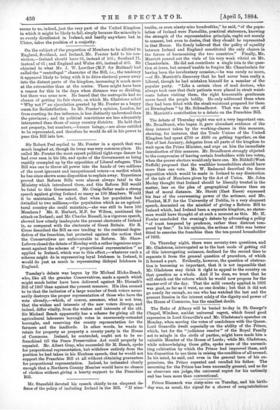The debate of Thursday night was not a very important
one.. Mr. Broadhurst, who began it, gave abundant evidence of the- deep interest taken by the working-classes in this measure, showing, for instance, that the Trade Unions of the United Kingdom had spent 2700 or 2800 on getting together, on the
of last January, delegates from all parts of the kingdom to wait upon the Prime Minister, and urge on him the immediate introduction of this measure. Mr. Broadhurst strongly objected. to the compromise of leaving certain freeholders with two votes,. when the poorer electors would only have one. Mr. Biddell (West Suffolk) proposed that the wealthier householders should have more than one vote. Mr. W. Redmond described the fierce opposition which would be made in Ireland to any diminution of the tale of Members given by the Act of Union. Mr. John Morley thought that Ireland should be liberally treated in the matter, less on the plea of geographical distance than on that of moral distance. Mr. Strutt (East Essex) expressed his fear of the overweening power of the artisans, and Mr. Plnnket, M.P. for the University of Dublin, in a very eloquent speech, descanted on the mischief of giving a Reform Bill to Ireland which, had Ireland been a separate kingdom, no states- man would have thought of at such a moment as this. Mr. H. Fowler concluded the evening's debate by advocating a policy "of trust tempered by prudence, rather than distrust tem- pered by fear." In his opinion, the artisan of 1884 was better fitted to exercise the franchise than the ten-pound householder of 1832.














































 Previous page
Previous page